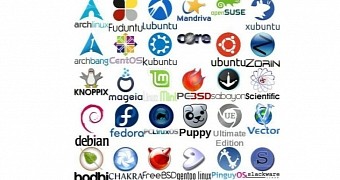One of the most common expressions that you will hear in the Linux community is platform fragmentation, and it's also one of the contra arguments that people spout when citing reasons not to get a Linux OS. I'm here to tell you why platform fragmentation is actually a good thing.
First of all, let’s explain what people mean by platform fragmentation, which is also sometimes referred to as desktop fragmentation. The Linux ecosystem is populated by hundreds of active Linux distributions, some of them more popular than others. There are lots of different desktop environments and some of them might feel redundant.
As you well know, Linux is not the desktop of choice for many people. In fact, the most optimistic numbers place the Linux desktop at around 1.7% of the market share. It's a lot, if we consider the total number of PCs in the world, but in the grand scheme of things it is very little.
It's not like Linux OS can't compete with their main two opponents, Windows and Mac OS X. In fact, Linux is better in many aspects and some of those features, like security for example, should ensure its domination. Being the most secure operating system out there doesn't seem to do much, and platform fragmentation is invoked as one of the reasons.
Linux developers have a habit of starting parallel projects when there is a perfectly good software that does the same thing. Or, better yet, they fork the original application and create their own. Sometimes they have good reasons to do so, but most of the times they are wrong.
The end result is a perceived chaos of applications, operating systems, desktop environments, you name it. Developers are pulling in every direction and the lack of a concentrated effort is damaging the platform in its entirety.
Surprisingly enough, platform fragmentation is actually one of the strengths of Linux. The fact that Linux developers can fork and develop their own version of the software means they also have the freedom to do so. On many occasions, the two parallel applications start borrowing features from one another and that improves both of them.
Platform fragmentation is also the direct result of complete freedom, something that can't really be experienced with other type of OSes. Users can choose what they want, even if sometimes they might be confused because there are too many similar things on their plate. The good software will always rise to the surface and that's true either for applications or distributions.
It's also argued from time to time that developers should unite their efforts to put together a better product. People tend to forget that most of the Linux ecosystem is open source and free. This means that developers work on what they like and do things exactly how they like. "Forcing" them to work on a project just for the sake of unity is not really a good idea.
As long as we perceive fragmentation as a bad thing, it will be just that, but we also have to keep in mind that a lot of the innovations and interesting things that happen in open source are because someone had an idea that didn't fit into their current paradigm.
Linux is not weaker because of fragmentation, it's actually stronger. The entire Linux experience is greater than the sum of all the parts, and the main reason for that is that there are "too many" parts to begin with.

 14 DAY TRIAL //
14 DAY TRIAL //